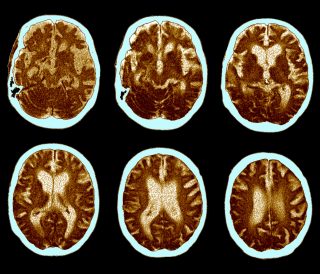The United States Food and Drug Administration (FDA) has approved the first new drug developed for Alzheimer’s Disease. This is the first development in over 20 years. Unfortunately, the decision and the drug itself appear to be controversial. The drug, known as Aduhelm (scientific name: aducanumab) has been developed by the Cambridge, Massachusetts-based company Biogen together with Japanese company Eisai Co. Its approval appears to hinge on the fact that U.S. regulators believe it is the only one that could treat the underlying disease, rather than manage symptoms[1].
Aduhelm – The Alzheimer’s Drug
The purpose of the drug is to clear harmful accumulations of a protein called beta-amyloid from the brain. This naturally occurring protein appears to be abnormally high in the brains of Alzheimer’s patients. It clumps together to form plaques that collect between neurons and disrupt cell function. This, in turn, leads to cell death.

Science Photo Library – ZEPHYR./Getty Images
Initially, Alzheimer’s disease tends to destroy neurons and their connections in parts of the brain used for memory. It later affects areas in the cerebral cortex responsible for language, reasoning, and social behavior. In the long term, many other areas of the brain are damaged, leading to the patient losing their ability to function independently[2].
Why the controversy?
Independent advisers to the FDA have warned that the treatment has not conclusively been shown to slow the progression of dementia.
The drug does not reverse the mental decline, and only one study seems to have indicated that it may slow it. The FDA is requiring that the drug-maker conduct further studies to confirm the benefits of the drug for patients. If it fails to prove effective, it could be pulled from the market.
Why approve it?
The FDA believes that the potential benefits outweigh the risks. Especially, because there is such a great unmet need for effective Alzheimer’s treatments. According to Alzheimer’s News Today, there are an estimated 44 million people worldwide living with Alzheimer’s Disease or a related form of dementia[3].
Reports from America’s National Institute on Aging indicate that one’s chance of Alzheimer’s Disease doubles every five years after age 65[4]. However, around one in 20 people with the disease is under 65. Early-onset Alzheimer’s can affect people as young as 40[5]. American statistics show that more than half of people over age 85 living in the USA suffer from dementia[6].
If these statistics do not seem alarming enough, consider that the global cost of Alzheimer’s disease and dementia is estimated to be US$605 billion, which is equivalent to one percent of the entire world’s gross domestic product[7].
The future of Alzheimer’s

Lightspring/Shutterstock
There is currently no effective cure or treatment for Alzheimer’s Disease, so one can understand the reason for the controversy. On the one hand, approving a drug that has not yet proven its benefits conclusively could set a dangerous precedent.
On the other hand, groups representing Alzheimer’s patients and their families say that any new therapy, even if it has a small benefit, warrants approval.
How this will play out remains to be seen. It is encouraging to see a revival of research into Alzheimer’s treatments, most of which have failed in the past. For most people living with the disease right now, however, this is of little help.
“Regardless of what medication is available, it is important to plan for the long-term needs of people suffering from dementia,” says Barry Kaganson, CEO of Auria Senior Living, which develops gold-standard senior living communities in South Africa.
“Specialised care is required for people living with dementia,” says Kaganson. “We believe the best environment is a residential setting which is properly tailored to their needs. Such an environment provides staff who are trained to deal with their particular requirements and offers appropriate and meaningful activities and wellness programmes. Such an environment not only reduces symptoms like anxiety in patients, but it also removes the stress on their families – which can be considerable given that their home environments are not well suited to the needs of the patient, and family members are often not trained to provide the right care.”

Lightspring/Shutterstock
The bottom line
Aduhelm might prove to be effective for treating Alzheimer’s Disease. Regardless, one’s best course of action for a relative with dementia is to provide them with a comfortable and supportive setting. This will enable them to live meaningful lives. Assisted living environments are often the best option as they can provide the right support.
“Many dementia sufferers can still live a life of interest and meaning – often without excessive medication. A caring and compassionate environment where help is provided with aspects of daily living such as routine, exercise, balanced diet, and healthy activity can still give a person quality of life despite their condition,” says Kaganson.
References
- https://www.cbsnews.com/news/fda-alzheimers-drug-approval-biogen-aduhelm/
- https://www.nia.nih.gov/health/what-happens-brain-alzheimers-disease
- https://alzheimersnewstoday.com/alzheimers-disease-statistics/
- https://www.nia.nih.gov/health/alzheimers
- https://www.nhs.uk/conditions/alzheimers-disease/causes/
- https://www.piedmont.org/living-better/can-you-beat-the-odds-of-developing-alzheimers-disease
- https://alzheimersnewstoday.com/alzheimers-disease-statistics/



![women [longevity live]](https://longevitylive.com/wp-content/uploads/2020/01/photo-of-women-walking-down-the-street-1116984-100x100.jpg)










